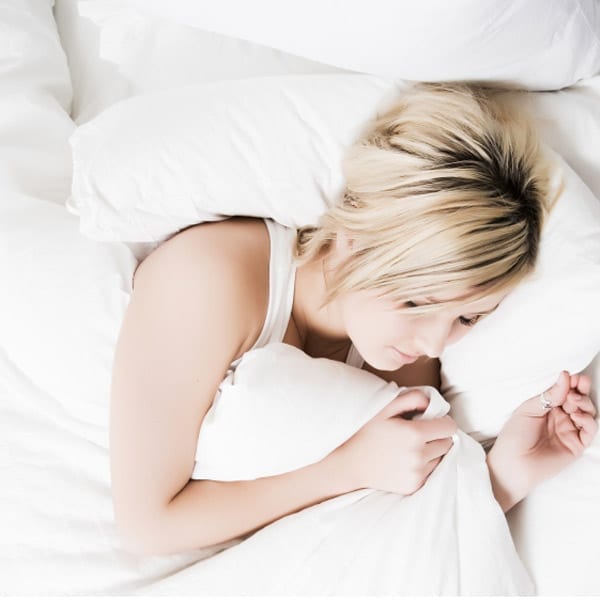Eat your way to a better night’s sleep
Do you have trouble dropping off to sleep at night, or do you feel sleep-deprived each morning? It could be time to look at your diet, says top nutritionist Angela Dowden.

Most of us have trouble sleeping at some point in our lives. It is usually the result of stress, feeling overworked or just having a problem ‘switching off’. But before you resort to sleeping tablets, some simple changes to your diet might tip the balance in favour of better and more refreshing sleep.
Food is a prerequisite to a good night’s snooze, for the simple reason that you won’t be hungry when you go to bed. Stomach rumblings lead to disturbed sleep and the strong likelihood that you’ll be awake in the early hours of the morning with the urge to raid the fridge.
On the other hand, if you eat a heavy meal or eat too late, you are more likely to suffer indigestion, which will also interfere with restful sleep. It’s best to have your evening meal no later than 8pm and ensure you eat enough to feel nicely satisfied rather than uncomfortably full.
Scientific studies have demonstrated that people describe feeling sleepier or calmer after eating carbohydrate-rich foods such as pasta, rice and bread, perhaps because these foods increase the levels of serotonin – a calming neurotransmitter – in the brain. So if sleep has been elusive, it could be a good idea to swap your evening meal of steak and salad for pasta – save the high-protein foods for lunchtime, to keep you alert during the afternoon.
Most insomniacs will stay away from coffee and other caffeinated drinks (which include cocoa) in the evening, but if you are particularly sensitive, your caffeine curfew may need to start earlier – perhaps as early as three or four in the afternoon.
If you have to haul yourself out of bed in the morning, eat a balanced, energising and nutrient-rich breakfast – a boiled egg, fruit juice and small bowl of muesli, for example. As well as lifting lacklustre energy levels, it will lay the foundations for healthy, regular meals during the day, which can increase your chances of good sleep.There’s certainly a grain of truth in the idea that a nightcap of warm milk with honey can send you to the land of nod. The natural sugars in it may stimulate serotonin release in the same way as a carb-rich meal. There’s also the possible psychological association between milk and sleep, as many of us were given this soothing drink as children. In fact, any warm drink can help trigger drowsiness (as can a warm bath) – owing to the fall in body temperature that follows the slight increase caused by the hot drink.
Herbalists might also suggest adding a little grated nutmeg to your warm milk, as it’s a source of myristicin. Myristicin has mind-altering qualities in large amounts, but in smaller amounts it has been credited with causing drowsiness and a sense of wellbeing, although this isn’t proven.
A hot toddy can also work well, and alcohol is a well-known sleep-inducing aid. But stick to one or two units (e.g. 50ml of whisky), as a higher intake may interfere with REM (rapid eye movement) sleep, resulting in a restless night.
If it’s muscle twitches, cramps or restless legs that keep you awake, try snacking on nuts and seeds – especially
Brazil nuts, sesame and sunflower seeds; all good sources of magnesium – sometimes referred to as the ‘tranquillising’ mineral because of its role as a muscle relaxant.
During the day, it also pays to eat plenty of tryptophan-rich foods, such as milk, cottage cheese, turkey and peanuts. Tryptophan is an amino acid (a building block of protein foods) involved in the production of serotonin and, in turn, of the sleep-inducing hormone melatonin.
Poor sleepers should avoid highly fatty or spicy foods, which can cause digestive discomfort and stimulate heart rate and blood pressure.
Cheese is often blamed for disrupted sleep and nightmares, but the British Cheese Board insists this is a myth. It asked 200 people to eat 20g of various cheeses before bed for a week and record their dreams. None had a nightmare, but Stilton-eaters did report that their dreams were particularly bizarre! This may be because blue cheese is high in tyramine, which is known to affect brain function.
For some, the issue is how many hours they get under the covers. Bristol University found that people getting less than five hours’ sleep had a 15% decrease in leptin (a hormone which suppresses appetite) and a 15% increase in ghrelin, the hormone which increases hunger. Indeed, American research shows you are more likely to be obese if you sleep less than the optimum seven to eight hours a day, so sleep may be as important for your waistline as it is for your sanity.
Subscribe to our magazine
Food stories, skills and tested recipes, straight to your door... Enjoy 5 issues for just £5 with our special introductory offer.
Subscribe
Unleash your inner chef
Looking for inspiration? Receive the latest recipes with our newsletter